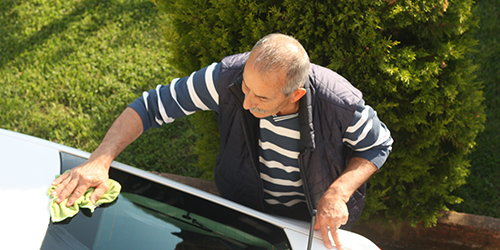
Your Spring-Cleaning Checklist for a Safer Home and Car
March 2025After a long winter, it feels great to throw open the windows and freshen up your home.
As you're creating your to-do list, here are a few opportunities to reduce the risk of having to file home and auto insurance claims in the year ahead.
1. Change your filters
It’s a fast fix that is easily overlooked, but a quick change of your heating, ventilation, and air conditioning (HVAC) filters can help reduce energy costs, mold risk, and the chance of costly repairs.
2. Clean your washing machine and dryer
Outside of the kitchen, clothes dryers are a leading cause of house fires, according to the National Fire Protection Association.1 Breaking it down further, lint and dust are the main triggers for dryer fires. It’s a good habit to clean your dryer filter after every load, but lint can also build up in other areas of the machine. Take the time to clean your dryer vent and duct for lint buildup.
While you’re at it, make sure to also clean your washing machine filter and drainpipes to prevent blockages that can lead to leaks and flooding. Washing machines are a common water leak hotspot, but with routine maintenance, most water leaks are usually preventable.

3. Test your smoke detectors and carbon monoxide alarms, and swap out replaceable batteries
If your smoke detectors are chirping, that usually means they’re due for a battery change. Get ahead of the surprise beeping and put in new batteries for peace of mind. We recommend checking or changing the batteries in both devices about every six months. Quick tip: Check batteries in the spring and fall when you change your clocks for daylight saving time.
4. Examine your roof for damage
Snow and ice can cause cracks, blustery winds can kick up shingles, and animals can burrow into your attic to get out of the cold. A clear day in spring is a great time to safely use a ladder to get on your roof and assess any damage that may have occurred during a hard winter.
A crack or hole may seem small in the moment, but can lead to:
- Animals and other wildlife getting into the interior of your home and causing damage, like chewing through electrical wires and insulation
- Water damage and mold risk
- Higher energy costs from escaping air and damaged insulation
- Falling and injuries to roofers, maintenance workers, or yourself!
Cracks or holes might not seem like a big deal at first—but putting off or failing to address small damages can result in big insurance claims down the line.
5. Clear your gutters
While you’re checking out your roof, give your gutters a once-over too. Clear out branches, leaves, and other debris that may have built up over fall and winter. Making sure that your gutters are doing their job—directing water away from your home structure and foundation—goes a long way in preventing water damage insurance claims.
6. Wipe off your windshield wipers or replace them, if necessary
Your windshield wipers may have taken a beating after a winter of clearing away snow and ice. Make sure they’re in good shape to ensure maximum visibility when spring showers arrive.
7. Get an oil change
Cold temperatures can be hard on your car, and a springtime oil change can help lubricate and protect your engine. If you change your car oil yourself, make sure you dispose of oily rags safely.
8. Give your car a good wash
Depending on your climate, you may have an accumulation of salt and other road debris on your tires, wheel wells, and undercarriage after a snowy winter. If left unchecked, this build-up can cause rust and corrosion—and a hefty repair bill.
Avoid insurance claims with spring cleaning
Annual maintenance of your home and car can go a long way in preventing insurance claim events. If you do need to file a claim, Mutual of Enumclaw is available 24/7 for award-winning claims assistance.
The information we share on our site is intended to serve as a general overview. Please refer to your policy or contact your local independent agent for specific coverage details.
Source: 1. "Home fires involving clothes dryers and washing machines," National Fire Protection Association, 2017.
Related


Home Maintenance Video: Preventing Dryer Fires
February 2025Dryer lint buildup is one of the most common causes of home fires. Here's how to prevent issues with routine maintenance.

Disposing of Oily Rags
March 2025After a painting or staining project, there's some important cleanup to do to help make sure your used rags won't cause a fire.

